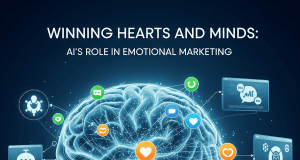In today’s fast-paced digital landscape, businesses are continually searching for innovative ways to connect with customers and enhance their engagement. One of the most transformative tools in this realm is the chatbot—an AI-driven solution that’s quickly gaining traction in the marketing world. As technology evolves, chatbots are redefining customer interactions, making them more efficient, personalized, and engaging.
The Emergence of Chatbots
Chatbots, software applications designed to simulate conversations with human users, have come a long way since their inception. Initially, they struggled to hold context and provide meaningful responses. However, advancements in artificial intelligence, particularly through natural language processing (NLP) and machine learning, have empowered chatbots to understand and respond to customer queries with impressive accuracy.
Today’s chatbots are not just programmed for customer support; they have become integral marketing tools that help businesses manage communications, drive sales, and foster customer loyalty.
Enhancing Customer Engagement
1. 24/7 Availability
One of the most significant advantages of chatbots is their ability to operate around the clock. Customers no longer have to wait for business hours to get their queries answered. This immediate access to information enhances customer satisfaction, as consumers can interact with brands on their terms at any time.
2. Personalization at Scale
Modern chatbots leverage data to deliver tailored experiences. By analyzing customer behavior and preferences, chatbots can provide personalized product recommendations, relevant content, and targeted offers. This level of customization not only improves user experience but also increases conversion rates, as customers are more likely to engage with content that resonates with their interests.
3. Streamlined Communication
Chatbots can handle multiple conversations simultaneously, providing quick responses and eliminating long wait times associated with traditional customer service methods. This efficiency frees up human agents to address more complex issues, allowing businesses to optimize their resources effectively.
4. Interactive Brand Experience
Unlike passive marketing channels, chatbots create interactive experiences. They can guide users through product selections, offer quizzes, and engage them with dynamic content. This interactivity cultivates a sense of involvement and keeps customers engaged longer.
Driving Sales through Chatbots
1. Lead Generation and Qualification
Chatbots can initiate conversations with potential customers visiting a website, guiding them through the sales funnel. They can ask qualifying questions, gather vital information, and nurture leads until they are ready to convert. This results in higher quality leads and improved conversion rates.
2. Facilitating Purchases
With integrated payment systems, chatbots can expedite the purchasing process. Users can complete transactions without navigating away from the chat interface, leading to a seamless shopping experience. Moreover, features such as cart abandonment reminders can help recover potentially lost sales.
Building Customer Loyalty
1. Ongoing Engagement
Chatbots can facilitate continuous engagement with customers post-purchase. By sending follow-up messages, requesting feedback, or announcing new products, brands can foster a sense of community and encourage repeat business.
2. Effective Issue Resolution
When issues arise, chatbots ensure that customers receive timely support, leading to quicker resolutions and less frustration. By addressing concerns rapidly, companies can maintain customer trust and loyalty.
Challenges and Considerations
While the benefits of chatbots in marketing are clear, companies must also navigate certain challenges. Ensuring that chatbots are equipped to handle complex queries requires ongoing refinement and updates. Additionally, striking the right balance between automation and human interaction is critical; customers still value the option to speak with a live agent when necessary.
The Future of Chatbots in Marketing
As technology continues to evolve, so too will the capabilities of chatbots. Enhanced AI, deeper integration with other marketing tools, and increased focus on user experience will lead to even more sophisticated solutions. Companies that embrace these advancements will be well-positioned to revolutionize customer engagement and stay ahead in a competitive landscape.
In conclusion, the rise of chatbots is transforming how brands interact with their customers. By offering personalized, efficient, and engaging experiences, chatbots not only drive sales but also foster lasting customer relationships. As businesses continue to invest in this technology, the future of customer engagement looks brighter than ever.









